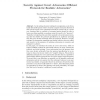Free Online Productivity Tools
i2Speak
i2Symbol
i2OCR
iTex2Img
iWeb2Print
iWeb2Shot
i2Type
iPdf2Split
iPdf2Merge
i2Bopomofo
i2Arabic
i2Style
i2Image
i2PDF
iLatex2Rtf
Sci2ools
108
click to vote
JOC
2010
2010
Security Against Covert Adversaries: Efficient Protocols for Realistic Adversaries
Abstract. In the setting of secure multiparty computation, a set of mutually distrustful parties wish to securely compute some joint function of their private inputs. The computation should be carried out in a secure way, meaning that no coalition of corrupted parties should be able to learn more than specified or somehow cause the result to be "incorrect". Typically, corrupted parties are either assumed to be semi-honest (meaning that they follow the protocol specification) or malicious (meaning that they may deviate arbitrarily from the protocol). However, in many settings, the assumption regarding semi-honest behavior does not suffice and security in the presence of malicious adversaries is excessive and expensive to achieve. In this paper, we introduce the notion of covert adversaries, which we believe faithfully models the adversarial behavior in many commercial, political, and social settings. Covert adversaries have the property that they may deviate arbitrarily from t...
Related Content
| Added | 19 May 2011 |
| Updated | 19 May 2011 |
| Type | Journal |
| Year | 2010 |
| Where | JOC |
| Authors | Yonatan Aumann, Yehuda Lindell |
Comments (0)

